
Advertising & Brands
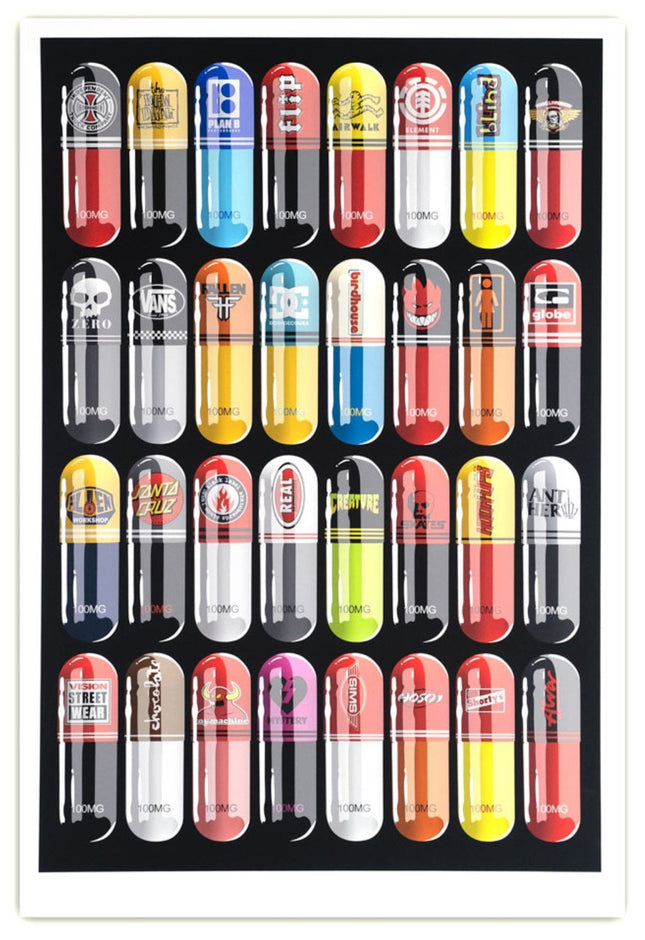
Denial- Daniel Bombardier Skate or Diet Oversized Archival Print by Denial- Daniel Bombardier
Skate or Diet- Oversized Archival Pigment Fine Art Limited Edition Print on 290gsm Moab Entrada Paper by Modern Pop Street Graffiti Artist Denial. 2021 Signed & Numbered Archival Pigment Print on 290gsm Moab Entrada Fine Art Paper Size: 24 x 36 Inches Release: November 04, 2021 Run of: 25 Minor Handling Creases The media and means used by the artist vary from aerosol spray painting to printmaking and from sculpturing to wood creations. The thematic of his works is equally diverse and extends from critiquing capitalism and major brands to mocking conspiracy
$456.00
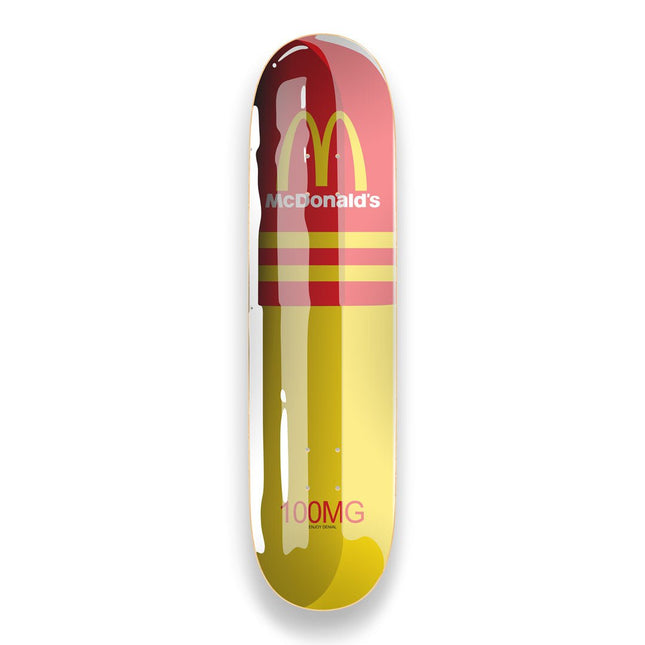
Denial- Daniel Bombardier McDonald Archival Skateboard Deck by Denial- Daniel Bombardier
McDonald Limited Edition Archival Pigment Print Transfer on Cold Pressed Steep Natural Skate Deck art by street pop culture artist Denial. 2019 Limited Edition of 50 In 2000 he adopted the moniker ‘DENIAL’ as a means of poking fun at advertising, politics, and media messages that contemporary society is often ‘in denial’ about. Since then he has maintained an ongoing global street-campaign of over 500, 000 stickers, placards, and murals, using the alpha-numeric characters ‘D3N!@L’. Denial is a Canadian artist who experiments with aerosol and stencil art, while his main fields of interest are consumerism, politics and the human condition in today’s society. Since the culture of graffiti was gaining more and more popularity in the US and Europe, the taggers had to be increasingly original in order to stand out. The signatures became bigger, more stylized and more colorful.
$466.00
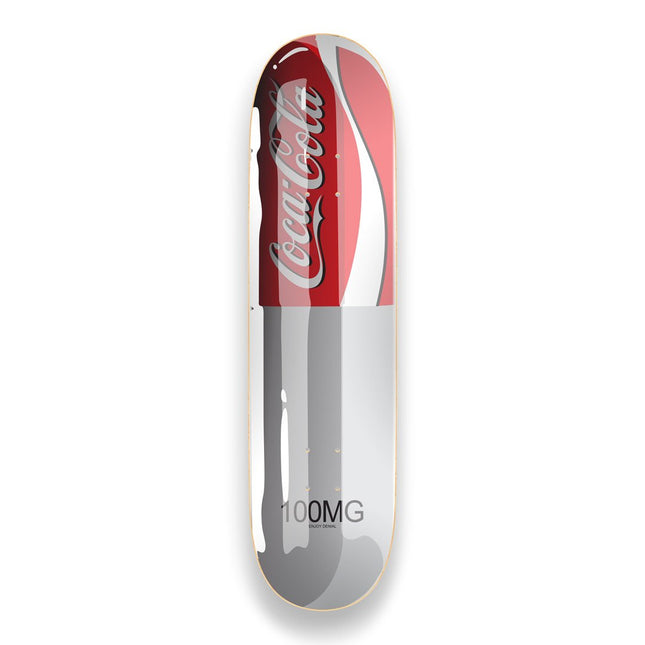
Denial- Daniel Bombardier Coca-Cola Archival Skateboard Deck by Denial- Daniel Bombardier
Coca-Cola Limited Edition Archival Pigment Print Transfer on Cold Pressed Steep Natural Skate Deck art by street pop culture artist Denial. In 2000 he adopted the moniker ‘DENIAL’ as a means of poking fun at advertising, politics, and media messages that contemporary society is often ‘in denial’ about. Since then he has maintained an ongoing global street-campaign of over 500, 000 stickers, placards, and murals, using the alpha-numeric characters ‘D3N!@L’. In the world of Denial, memory is important, because it is the basis of his work, as it nostalgically encourages the audience to engage with it. As a result, his art is as familiar, as it is disturbing because it reveals the most unsettling parts of society, the ones we are in a “denial” of. No matter its controversial history, graffiti is less and less viewed as a form of vandalism.
$466.00
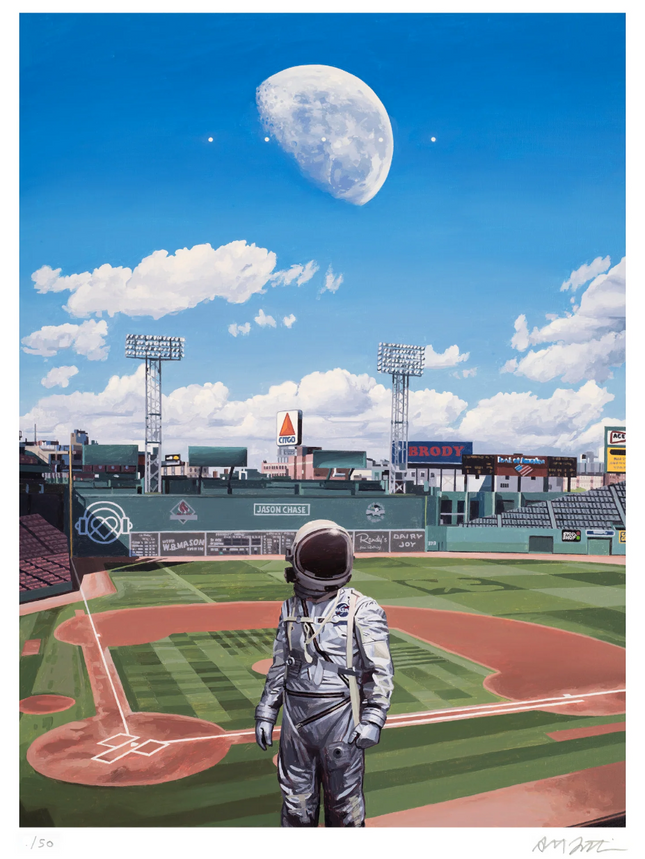
Scott Listfield Fenway Archival Print by Scott Listfield
Fenway Archival Print by Scott Listfield Limited Edition Print on 290gsm Moab Entrada Rag Bright Paper Pop Artist Modern Artwork. 2023 Signed & Numbered Limited Edition of 50 Artwork Size 18x24 Archival Pigment Fine Art "Fenway Archival Print" by Scott Listfield is an art piece by the artist Scott Listfield, who is known for his distinct style of painting astronauts exploring landscapes filled with elements of pop culture and contemporary society. The title "Fenway Archival Print" is set in Fenway Park, the iconic baseball stadium in Boston, Massachusetts, home to the Boston Red Sox. Listfield has incorporated Fenway Park, the surrounding neighborhood, or some other related elements into the artwork, combined with his signature astronaut figure. Since this is an "archival print," the artwork is a high-quality reproduction of the original painting, using archival inks and paper to ensure long-lasting color and quality. These prints are often signed and numbered by the artist, making them valuable collector's items.
$518.00$440.00
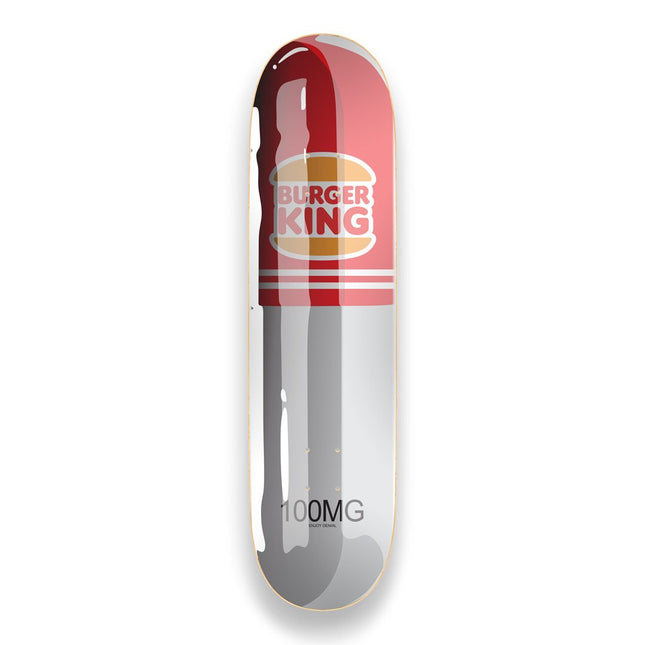
Denial- Daniel Bombardier Burger King Archival Skateboard Deck by Denial- Daniel Bombardier
Burger King Limited Edition Archival Pigment Print Transfer on Cold Pressed Steep Natural Skate Deck art by street pop culture artist Denial. In 2000 he adopted the moniker ‘DENIAL’ as a means of poking fun at advertising, politics, and media messages that contemporary society is often ‘in denial’ about. Since then he has maintained an ongoing global street-campaign of over 500, 000 stickers, placards, and murals, using the alpha-numeric characters ‘D3N!@L’. Denial has evolved as one the most prominent figures of contemporary pop artists, who nonetheless, continue to stay relevant and is interested in generating thought-provoking commentary. He has a long history of exploring the boundaries of appropriation, which he uses as a means of subverting the value of cultural products, imprinted in the collective memory of the Western civilization. His work, in other words, is inviting the viewer to re-imagine our dystopian society as a way of confronting it, with humor and irony as the biggest tools of the artist.
$466.00
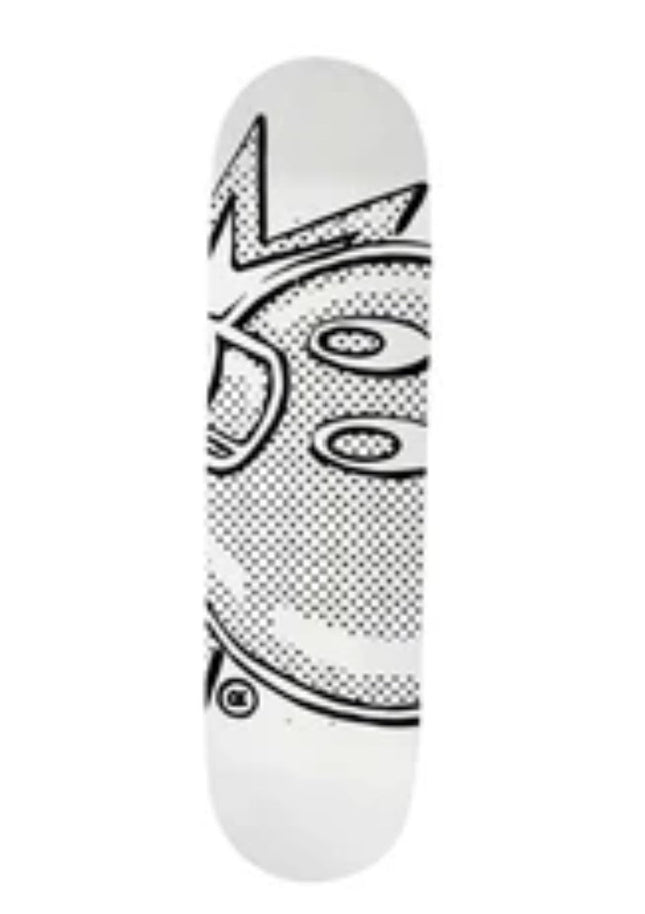
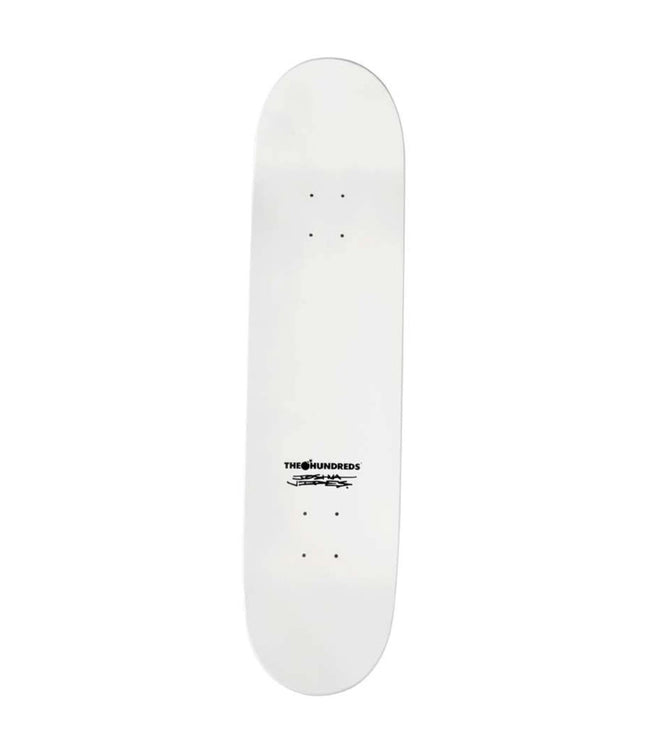
Joshua Vides Vides Adam Skateboard Art Deck by Joshua Vides
Vides Adam Deck Limited Edition Silkscreen Skateboard deck art by street pop culture artist Joshua Vides.
$329.00
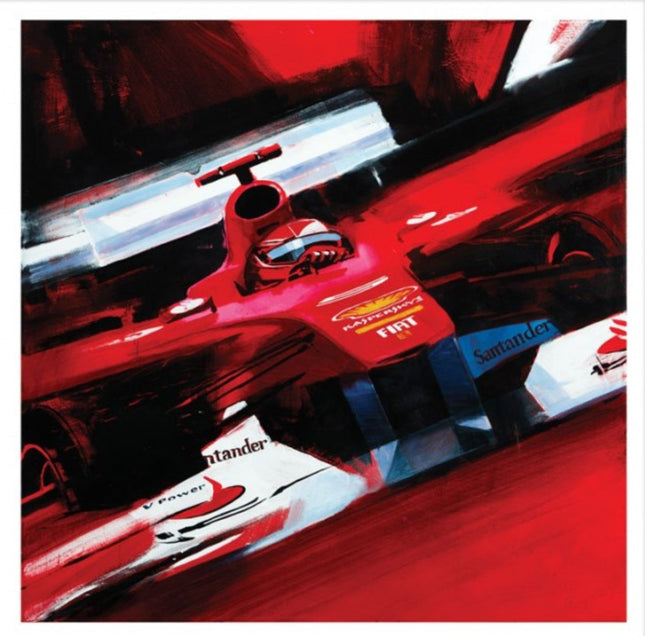
Camilo Pardo Alonzo Liter Archival Print by Camilo Pardo
Alonzo Liter Limited Edition Archival Pigment Prints on 310gsm Fine Art Paper by Camilo Pardo Graffiti Street Artist Modern Pop Art. The art that Camilo Pardo has created over the years is all over Detroit. A considerable amount of it is present on our freeways at any given moment of the day. Most recognized for his design work on the Ford GT, Camilo put verve in the steel curves and reminded us that a car's first internal combustion takes place in an artist's mind.
$438.00
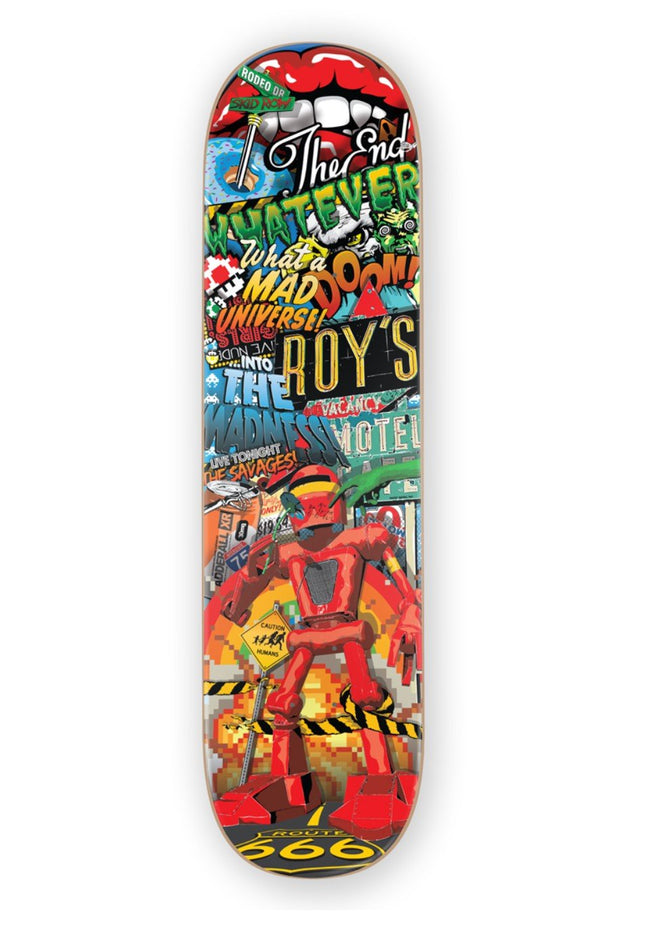
Denial- Daniel Bombardier Into The Madness Archival Skateboard Deck by Denial- Daniel Bombardier
Into The Madness Deck Fine Art Limited Edition Archival Pigment Print Transfer on Cold Pressed Steep Natural Skateboard Deck by Street Artwork Graffiti Artist Denial. 2020 Limited Edition of 50 Archival Pigment Print Transfer on Cold Pressed Steep Natural Skate Deck Size: 8 x 31.875 Inches Release: July 20, 2020 In the world of Denial, memory is important, because it is the basis of his work, as it nostalgically encourages the audience to engage with it. As a result, his art is as familiar, as it is disturbing because it reveals the most unsettling parts of society, the ones we are in a “denial” of. No matter its controversial history, graffiti is less and less viewed as a form of vandalism.
$431.00
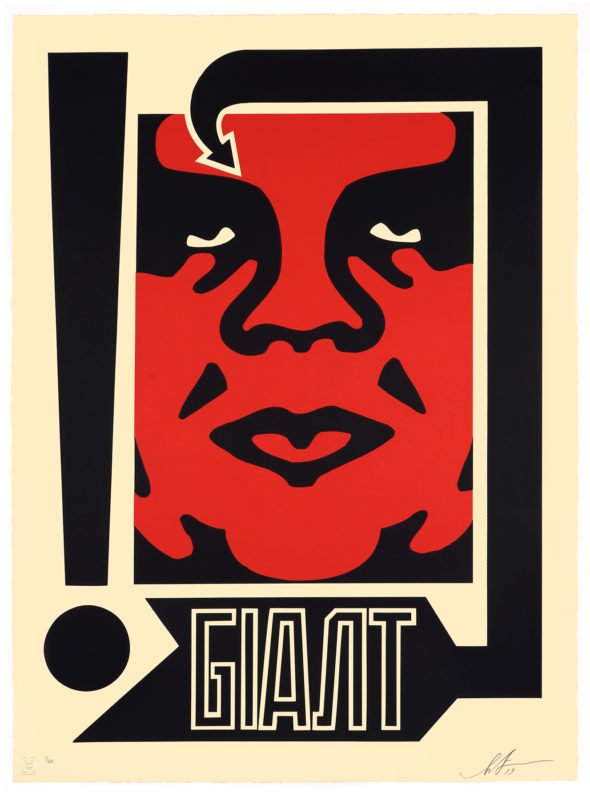
Shepard Fairey- OBEY Exclamation- Large Format Serigraph Print by Shepard Fairey- OBEY
Exclamation- Large Format Limited Edition Hand Pulled 2-Color Serigraph Print on Coventry Rag, 100% Cotton Custom Archival Paper with hand-deckled edges by Shepard Fairey Graffiti Street Artist Modern Pop Art. The evolution of Andre produced the simplified Obey icon face, the Obey star, and the Obey red box logo, which was inspired by the work of Barbara Kruger. These icons, along with various elements from the original sticker, became the building blocks of Shepard Fairey’s visual repertoire. Their repeated incorporation into the artwork is to mimics the strategic mechanism used by brands and advertising. Serigraph on Coventry Rag, 100% Cotton Custom Archival Paper with hand-deckled edges. 30 x 41 inches. Signed by Shepard Fairey. Numbered edition of 89.
$4,583.00
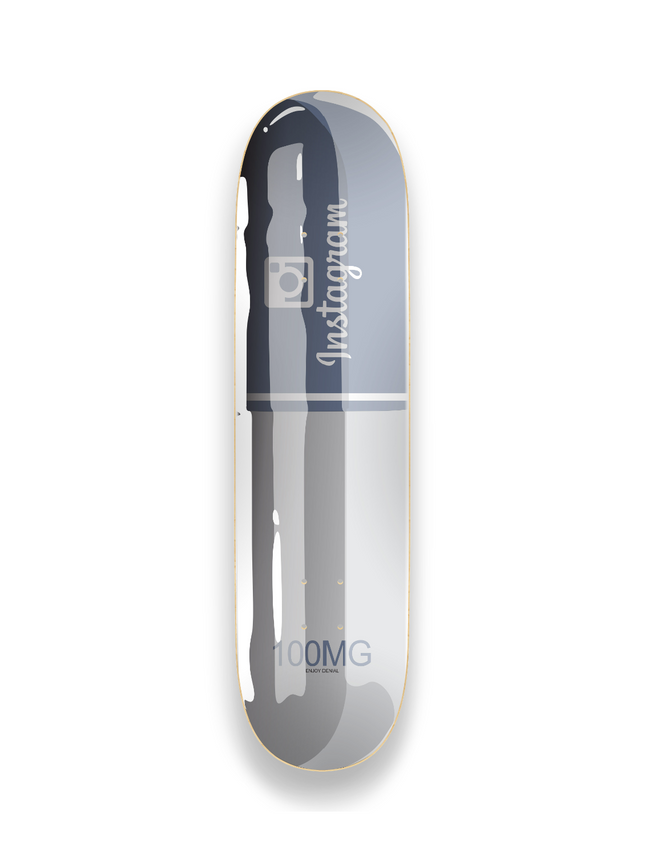
Denial- Daniel Bombardier Instagram Pill Archival Skateboard Deck by Denial- Daniel Bombardier
Instagram Pill Limited Edition Archival Pigment Print Transfer on Cold Pressed Steep Natural Skate Deck art by street pop culture artist Denial. 2019 Limited Edition of 50 In 2000 he adopted the moniker ‘DENIAL’ as a means of poking fun at advertising, politics, and media messages that contemporary society is often ‘in denial’ about. Since then he has maintained an ongoing global street-campaign of over 500, 000 stickers, placards, and murals, using the alpha-numeric characters ‘D3N!@L’. Denial’s art is strongly political and social since the artist takes specific positions against issues, such as capitalism, consumer culture, and advertisements. More importantly, the artist is aware of his choices and motivations: “I like to think of myself as activist pop art. How I relate with cartoons and graphics is a lot easier than I do with photo-realistic stuff" Another aspect of Denial's work is humor. His work is satirical, which, by definition, means that it uses humor as a confronting mechanism.
$466.00












